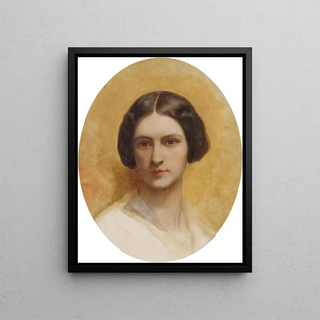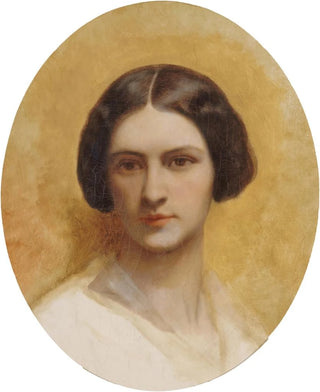Art print | Portrait of Cornélia Marjolin-Scheffer - Ary Scheffer


View from behind

Frame (optional)
The "Art print of Cornélia Marjolin-Scheffer" by Ary Scheffer is a masterpiece that embodies the very essence of 19th-century romantic painting. This painting, both delicate and powerful, immerses us in the intimate world of the portraitist and her model, Cornélia Marjolin-Scheffer. Observing this work, one feels a deep connection to the era of its creation, where emotions and artistic sensitivity took precedence over academic conventions. The depiction of Cornélia, with her delicate features and contemplative gaze, invites reflection on the feminine condition and art as a mirror of society.
Style and uniqueness of the work
Ary Scheffer's style is characterized by a subtle use of light and shadow, creating an almost ethereal atmosphere around his subjects. In this art print, the soft color palette enhances the beauty of Cornélia, while the meticulous details of her clothing and accessories demonstrate great care in the representation. The composition, focused on the expressive face of the model, captures attention and evokes palpable curiosity. This artistic choice highlights not only physical beauty but also the psychological depth of Cornélia, making the viewer a confidant of her personal story. The work stands out for its humanity, a quality that transcends time and styles, touching directly the hearts of those who contemplate it.
The artist and his influence
Ary Scheffer, a Dutch-born painter who became a French citizen, established himself in the artistic landscape of his time thanks to his exceptional talent and his ability to translate complex emotions through his works. Influenced by the Romantic movement, he captured the sensitivity of his contemporaries while drawing inspiration from the great masters of the past. His innovative approach to portraiture, blending realism and idealization, marked a generation of artists and helped redefine the aesthetic standards of his era. By painting Cornélia Marjolin-Scheffer, he does not merely depict a female figure but elevates his subject to

Matte finish

View from behind

Frame (optional)
The "Art print of Cornélia Marjolin-Scheffer" by Ary Scheffer is a masterpiece that embodies the very essence of 19th-century romantic painting. This painting, both delicate and powerful, immerses us in the intimate world of the portraitist and her model, Cornélia Marjolin-Scheffer. Observing this work, one feels a deep connection to the era of its creation, where emotions and artistic sensitivity took precedence over academic conventions. The depiction of Cornélia, with her delicate features and contemplative gaze, invites reflection on the feminine condition and art as a mirror of society.
Style and uniqueness of the work
Ary Scheffer's style is characterized by a subtle use of light and shadow, creating an almost ethereal atmosphere around his subjects. In this art print, the soft color palette enhances the beauty of Cornélia, while the meticulous details of her clothing and accessories demonstrate great care in the representation. The composition, focused on the expressive face of the model, captures attention and evokes palpable curiosity. This artistic choice highlights not only physical beauty but also the psychological depth of Cornélia, making the viewer a confidant of her personal story. The work stands out for its humanity, a quality that transcends time and styles, touching directly the hearts of those who contemplate it.
The artist and his influence
Ary Scheffer, a Dutch-born painter who became a French citizen, established himself in the artistic landscape of his time thanks to his exceptional talent and his ability to translate complex emotions through his works. Influenced by the Romantic movement, he captured the sensitivity of his contemporaries while drawing inspiration from the great masters of the past. His innovative approach to portraiture, blending realism and idealization, marked a generation of artists and helped redefine the aesthetic standards of his era. By painting Cornélia Marjolin-Scheffer, he does not merely depict a female figure but elevates his subject to






